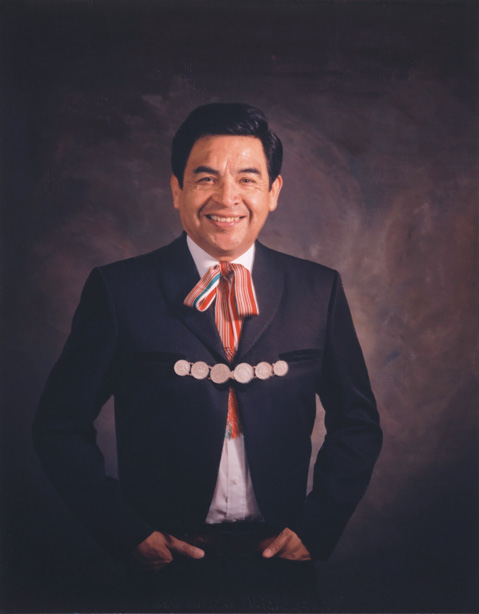Alberto Pizano was a multitalented man. He founded nonprofits, he was an artist, and he was an intellectual. He could lay tile, build a block wall, paint, and sculpt. He was an avid reader, and his library of books is extensive and amazing. Before his death, he was reading his favorite book, Moby Dick, for the fourth time. He had a particular passion for history and could tell you anything you wanted to know without having to look it up. But where he truly excelled and demonstrated great talent was in his ability to communicate through the written word.
Our family wishes to share excerpts from some of his many writings to give you a more personal glimpse of a man whom we proudly call dad, grandpa, father-in-law, and husband.
•••
The Mariachi Festival, however, turned out to be not just a successful financial venture or a highly entertaining stage production. It quickly became an iconic cultural event for the thousands of Latinos in the greater Santa Barbara area. For many, it was a remembered yesteryear, it was the almost unbearable cascading of a lifetime of memories, it was the music of bautismos, cumpleaños, quinceañeras, of bodas, and, ultimately, of entierros. It was the half-remembered time, en aquellos tiempos, when thousands of families and friends gathered in backyards across a hostile Southwest United States and played the instruments and sang the mystic songs of their forefathers. [Mariachi Festival, 15th anniversary program, 2010]
•••

Yes, I am an American, not unlike the descendants of immigrants from Europe (except that I was born in my now-American ancestral lands). The color of my skin made it difficult to be a “real” American. But the sweep of demographic history, the force of the U.S. Constitution, and an awakened human decency that asserted itself during the turmoil of the 1960s have given me and all Latinos a place at the table, a slice of the American pie, and may well put Latinos in a position where they will play a major role in determining the course of America’s destiny. The salt of Dandi is in our hands — not symbolic of casting off foreign oppression, as it was for Gandhi, but of the freedom Latinos seek, despite continuing obstacles, to fully pursue Thomas Jefferson’s promise of happiness in America, a land that is, and has always been, firmly and irrevocably mi tierra. [The Santa Barbara Independent, 2012]
•••
“¿Dime que dice? ¿Que quiere?” “Tell me what he says? What does he want?” my parents asked. The tall, blond, blue-eyed man with gold-rimmed glasses, stern and resolute, stood at the front door of our small house, demanding something. Though I could speak some English, I could not fully understand what he wanted. My parents, huddled in a back room of our small, second-story duplex, mortified, unable to speak English, perhaps knowing they were unable to meet the demands of the man standing on the creaky floor of the front porch, did not speak to the man. Soon after he left, the electrical service to our home was shut off.
At dinner that night all of the children were silent, and my mother appeared close to tears, something she never permitted herself to do, and did not that night. She had set candles on the dinner table and quietly served our meals. My father, grim but stoic, finally smiled and said, “Don’t feel bad, children. This is the way the rich people eat — by candlelight.” We all laughed and dug into our meals. [Autobiography]
•••
When the Spanish explorer Sebastián Vizcaíno sailed through the Santa Barbara Channel in 1602, he started a centuries-long history of Spanish influence in Southern California that persists to this day. This influence, this Spanish and eventually Mexican presence, has colored almost every facet of life in the many cities that they founded, including Santa Barbara. They left their language, their religion, their social customs, their values and ideals, and named almost every geographical landmark and every settlement that together would later become the Southwest United States. It is not unreasonable to conclude that among the Spanish cultural legacies, they also left the love of music and dance, including the art of flamenco. [Flamenco Arts Festival, 2001]
•••
Alberto Pizano is survived by his wife, Lillian, of 65 years; his daughters, Vibiana Pizano Smith and Sonia Pizano-Bellotti; grandchildren Pablo Pizano and Jaclyn Pizano Smith; and sons-in-law Brian Smith and Philip Bellotti. He is predeceased by his two sons, Paul Pizano and Michael Pizano.
Donations may be sent to Visiting Nurse & Hospice Care at 509 East Montecito Street, Santa Barbara, CA 93101 or vnhcsb.org/donate. n
